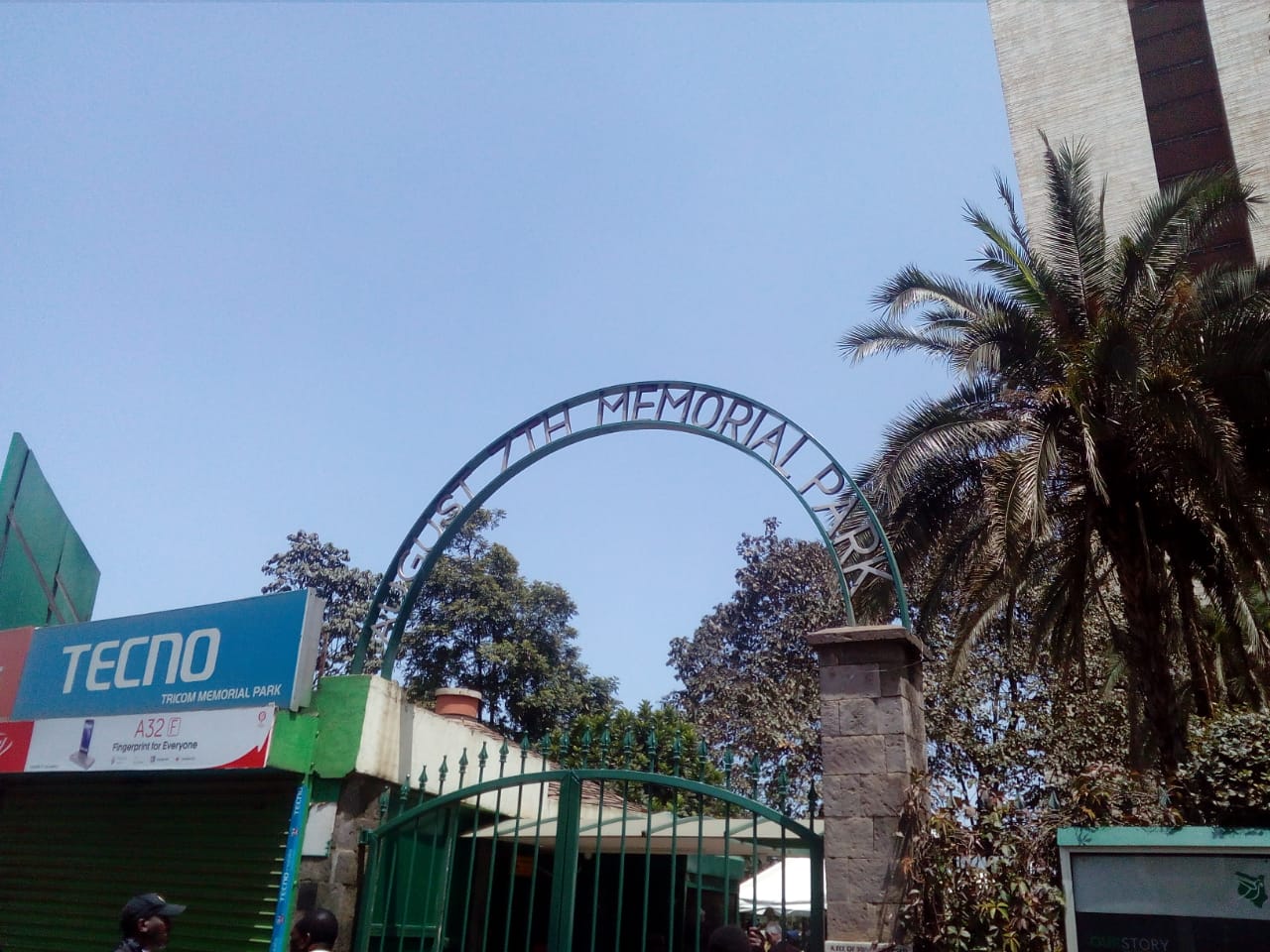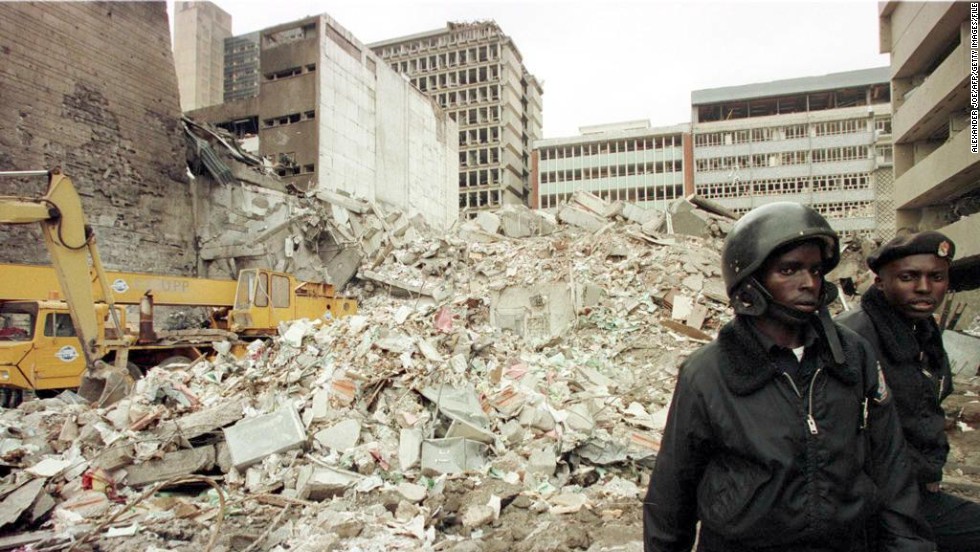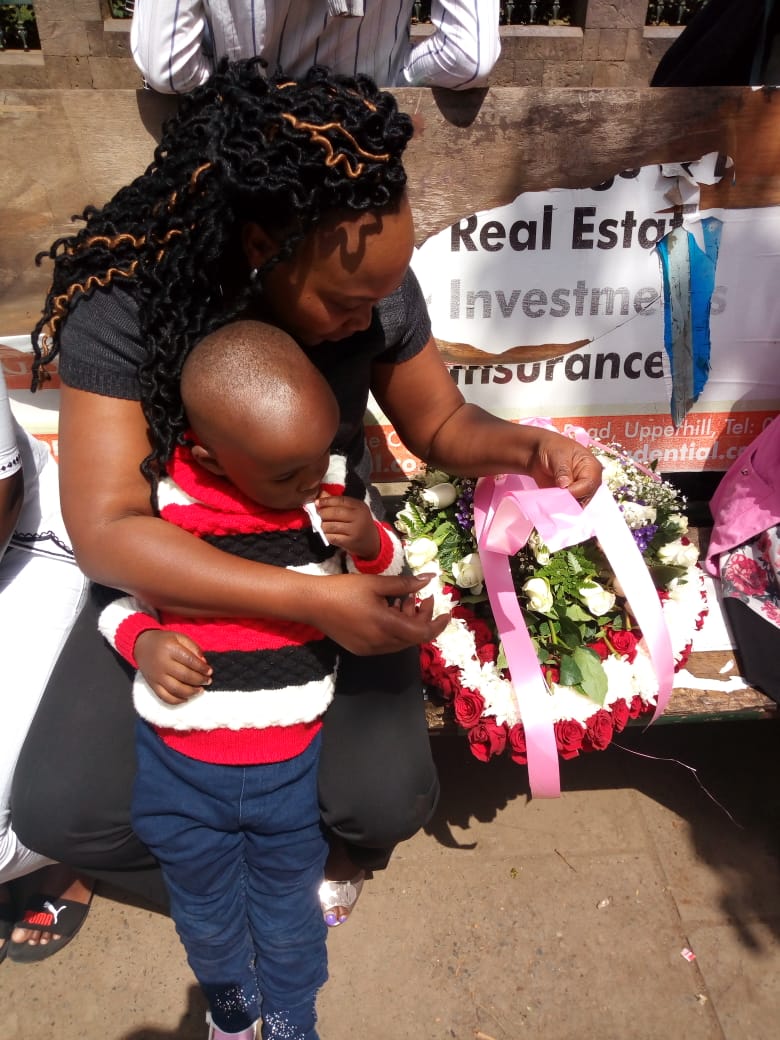[dropcap]E[/dropcap]very year on August 7, a group of people — survivors and relatives of victims of the 1998 bombing in Kenya — commemorate the loved ones lost in the deadliest terrorist attack in the country. In 2018 however, not all were happy as protocol surrounding the 20th anniversary of the terror attack meant limited access to the site.
Among them is Monica Wanjiru Wanjiku who was only 16 years old when terror struck. Now 36, the mother of two says if ‘special people’ really wanted to commemorate the day, they should have picked another day so as not to interfere with those who have made the annual remembrance a tradition. “If they wanted to restrict people, then they should have picked another day. We should have been left to do what we are used to.”

Every year, the group which broadly calls itself the August 7th Association comes to the Memorial Park at the Haile Selassie Avenue/Moi Avenue junction. The group consisting of bomb blast survivors as well as relatives and friends of victims was alarmed that after 20 years, they could not access the Park.
“We have membership cards, and the names of our departed are commemorated by a plaque in the Park. But today, I came as usual with a wreath of flowers only to be told that we have no invitation.”
The ceremony was graced by, among others, US Ambassador to Kenya Robert Godec and Ambassador Martin Kimani, Director of Kenya’s National Counter Terrorism Centre, amid tight security that only allowed dignitaries, selected guests and accredited journalists entry into the park.
“We were not aware anyone was coming. Not even the people from the American Embassy. We were not told anything.”
Monica’s story
Monica tells of the cathartic nature the remembrance brings every August when she remembers her mother, Agnes Wanjiku Gitau, who lost her life in the terror attack.
The protocol of the 20th anniversary has brought back a flood of negative emotions. “Of all the years, this year I have felt as I did in that first year since my mum died. I wish I had been given the opportunity to just go and lay my flowers at the site,” she says. “Today is a very sad day for me.”
She relives, August 7, 1998 which for her began as a normal day. “It was a day after I had closed school,” Monica says. At the time, she was in form two.
Her mother, Agnes Wanjiku Gitau, was working at the Ufundi Co-operative House. She had asked Monica to bring her report form to the workplace for reasons of securing a loan for the next term’s school fees. As Monica was preparing to head to town, she was told to abandon her plans after it emerged that a bomb blast had rocked the city. Monica did not think much of the reports. “I thought it was like a tyre burst, but nothing so serious,” she says.

Reports of the location where the bomb blast had occured emerged. Ufundi House was being mentioned in the news, and when it got to 5pm and her mother had not arrived home, her and her family started fearing the worst.
“We saw on the news how Ufundi House had been destroyed, but we still did not think our mum had passed away. We knew her as someone who was very active so we hoped she had moved away from her work station at that specific moment of the blast.”
She hadn’t. After three days of searching in hospitals and at the City Mortuary, the family of six siblings found their mother on the Tuesday after the blast. “She was one of the last people to be removed from the rubble,” Monica says. “My mum was one of the last people to still be speaking by the end.”
The body of Agnes was removed from the rubble still intact, although she had injuries to the head. “I think some stones fell on her head and that is what unfortunately may have killed her,” Monica narrates.
Life changed forever for the single-parent family of seven. The sole carer and breadwinner was removed from their lives and it became an uphill struggle to survive for the five girls and one boy. “We were all young,” narrates Monica who is the fourth born in the family. “None of us was above the age of 23 years.”
Monica tells of how the six siblings had to effectively “bring themselves up” as well as having to engage in different ventures which would then be pooled together to help the family.
Initially, there was a boost of finances after a Ksh1 million awarded to cover the cost of funeral expenses. “With part of the money, we decided to buy the rental home in Dagoretti where we were staying at the time. The money allowed us to survive for at least two years.”
After two years however, times became tough. Monica cites the especially heavy effect the death of her mother had on their brother, the only male in the family. At the time, her brother had just finished secondary education. “He keeps talking about mum to this day and you can tell, he is not okay.”

There has been no compensation since. “The Ksh1 million was only for funeral expenses. You can imagine that in a home with no income, that is the money we used to buy the plot, to build, to pay for school fees, for food… well, maybe you can say it was much then because it sustained us for two years. But after that, things changed.”
Now, all the members of the family are grown and have their own families. Monica has two sons, 16 and 10 years old respectively. She runs an online business.
As we speak, she is desperate for her wreath to be taken into the Memorial Park at whatever cost. Some members of the media decline her request. Eventually, she passes her flowers to an Association member who is allowed access.
READ: KTN LOSES ANOTHER AWARD-WINNING JOURNALIST
She then leaves, partly satisfied, to go oversee her online business. Her fellow Association members remain at the site in the hope that when the ceremony ends, they will be allowed in to perform their annual commemorative tradition.












Leave a comment